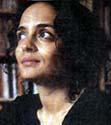 Guida all'impero per la gente comune
Guida all'impero per la gente comune

Il volume è una raccolta di saggi sui grandi temi sui quali Arundhati Roy è impegnata in prima persona: dalla battaglia per la democrazia in India, con una analisi della classe politica indiana che ha corroso il midollo della democrazia parlamentare laica per il proprio tornaconto elettorale; agli spaventosi "giochi nucleari" in cui sono coinvolti India e Pakistan; al come contrastare l'Impero, che non è soltanto il governo statunitense e i suoi satelliti europei, la Banca mondiale o il fondo monetario internazionale, ma è qualcosa di più. In molti paesi l'Impero ha generato sottoprodotti pericolosi: nazionalismo, fanatismo religioso, fascismo e terrorismo.
Dall'intervista di Irene Bignardi al Festivalletteratura 2003 di Mantova
Guida all’Impero per la gente comune è l’ultima fatica di Arundathi Roy, che per Irene Bignardi “non è solo una grande scrittrice. Il potere di seduzione della sua scrittura parla anche dei problemi che angustiano il mondo, facendola esporre in prima persona a rischi perfino del carcere. Personaggio complesso – laureata in architettura, attiva nel cinema come sceneggiatrice e attrice - è scrittrice di grande spettro in grado di passare dal romanzo alla prosa politica sociale. Non sono molti gli scrittori che hanno questi ritmi”.
A lei la parola, dunque: “Mi interessa la relazione tra l’impotenza e l’essere privi di potere. Ora il mondo è in uno stato precario, stiamo assistendo a una mutazione della democrazia; la stessa democrazia, manipolata, può diventare un istituto pericoloso”. “Credo che dobbiamo smettere di parlare in termini di singoli paesi, che sia necessario far sprigionare i legami tra i popoli aggirando gli stati”.” La letteratura può avere un potere sovversivo di lettura del mondo. Non c’è nulla che amo di più della scrittura narrativa. Il Dio delle piccole cose è nato dal mio incontro con una piccola magia.
Quando i tempi saranno maturi anche io scriverò un altro romanzo. Bisogna essere un po’ buddisti in queste cose: bisogna sapere aspettare, mai spingere le cose. E anch’io sto aspettando questo momento”
|
|

Nata nel 1961 nella regione del Kerala, ・la pi・famosa scrittrice indiana contemporanea. Vive a New Delhi. Nel 1997 ha vinto il prestigioso Booker Prize con "Il dio delle piccole cose".
Born in 1961 in Bengal, Arundhati Roy grew up in Kerala. She trained as an architect at the Delhi School of Architecture, but abandoned the field and became better known for her complex, scathing film scripts. She wrote and starred in In Which Annie Gives it Those Ones, and wrote the script for Pradip Kishen's Electric Moon. Media attention came when she spoke out in suapport of Phoolan Devi, who she felt had been exploited by Shekhar Kapur's film Bandit Queen. The controversy escalated into a court case, after which she retired to private life to work on her first book, The God of Small Things, which was published in 1997. The half-million pound advance on this book, more than Vikram Seth's for A Suitable Boy, shot her to fame again. As the daughter of Mary Roy, the woman whose court case changed the inheritance laws in favour of women, she was closely acquainted with the Syrian Christian traditions which feature prominently in the book.
She says "a feminist is a woman who negotiates herself into a position where she has choices.."
The God of Small Things, won Britain's premier book prize, the Booker McConnell, in 1997. Although Indian authors such as Salman Rushdie and Rohinton Mistry have featured in the Booker shortlist, and Rushdie's Midnight's Children won the 'Booker of Bookers', Roy is the first non-expatriate Indian author and the first Indian woman to have won this prize. To top it all, this happened in 1997, India's 50th anniversary of independence from Britain. As always, the exclusions and choices of the Booker judges created some controversy, with some critics praising the lush imagery of Roy's book while others referred to it as 'tripe'. The book has also attracted a lawsuit and angry criticism from Kerala's leftists. Newsclips follow.
Much speculation ensued about her next project: would it be a play, another novel, or poetry? Roy squelched the gossip by saying that she might never write another novel and had no intentions of trying to rival the success of her first. In keeping with her longtime interest in social issues, she has immersed herself in causes such as the anti-nuclear movement and the Narmada Bachao Andolan. Her two major essays, The End of Imagination and The Greater Common Good are available online as well as in print. Her personal fame has drawn attention and donations to these causes, and she has also made significant monetary contributions herself. Her involvement in these causes has also attracted controversy, with some criticism from all sides of the political spectrum. |